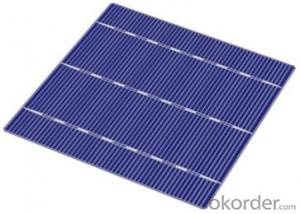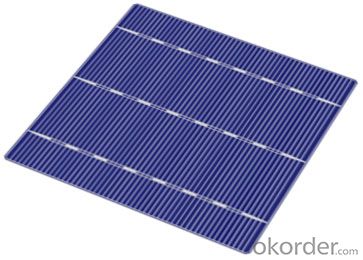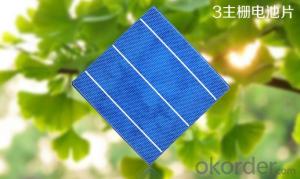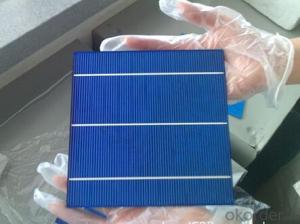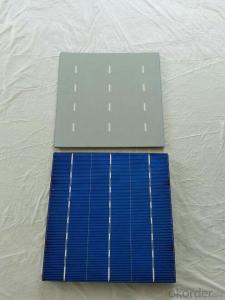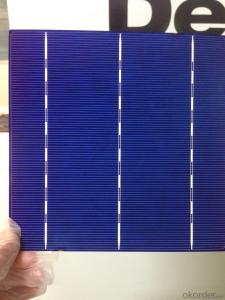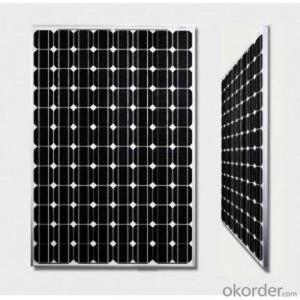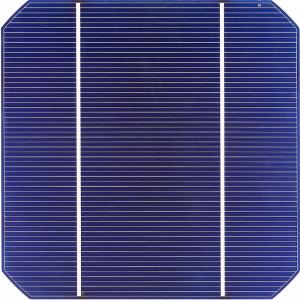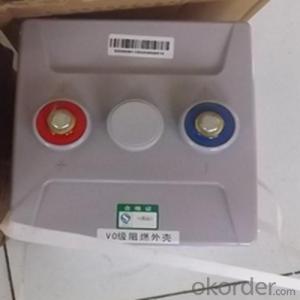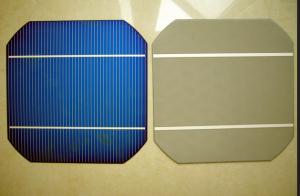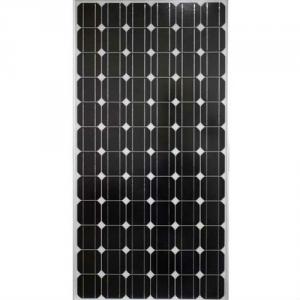Thin Film Solar Cells 3bb Chain
- Loading Port:
- China Main Port
- Payment Terms:
- TT OR LC
- Min Order Qty:
- -
- Supply Capability:
- -
OKorder Service Pledge
Quality Product, Order Online Tracking, Timely Delivery
OKorder Financial Service
Credit Rating, Credit Services, Credit Purchasing
You Might Also Like
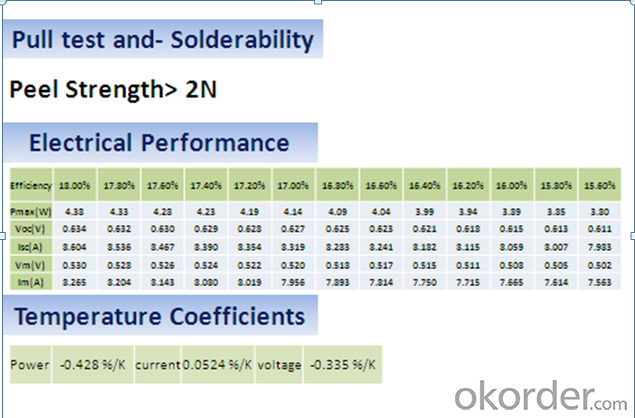
We supply regular mono 125x125mm and poly 156x156mm solar cells.
Cells made in China mainland and Taiwan are both available.
Cell production capacity yearly reach 1GW.
Our cells pattern include continuous and uncontinuous busbar to meet different cells line.
- Q: Can solar cells be used for powering concert venues?
- Yes, solar cells can be used for powering concert venues. Solar panels can be installed on the rooftops or surrounding areas of the venue to harness sunlight and convert it into electricity. This renewable energy source can help reduce reliance on traditional power grids and decrease carbon emissions associated with concert operations. While the size and capacity of the solar system would depend on the energy needs of the venue, it is a viable option for powering concert venues in a sustainable and environmentally friendly manner.
- Q: What is the role of anti-reflective coatings in solar cells?
- The role of anti-reflective coatings in solar cells is to minimize the reflection of sunlight that hits the surface of the solar cell. By reducing reflection, more light can be absorbed by the solar cell, thus increasing its overall efficiency and power output. This allows for better utilization of sunlight and helps to maximize the energy conversion process in solar cells.
- Q: What are the advantages and disadvantages of solar panels and diodes?
- I first connected to a positive and negative, and then in the positive series more than one, is not it can be achieved to prevent short circuit, to prevent the return can also play a rectifier 3 role?
- Q: How do solar cells perform in areas with limited space for installation?
- Solar cells can still perform efficiently in areas with limited space for installation through the use of innovative technologies such as rooftop and building-integrated photovoltaics. These systems maximize the use of available space, allowing solar cells to generate electricity even in compact urban environments. Additionally, advancements in solar cell design and efficiency have made it possible to produce more power from smaller areas, further optimizing electricity generation in limited spaces.
- Q: Can solar cells be used in water?
- Yes, solar cells can be used in water. Some solar panels are specifically designed to be used in water environments, such as floating solar panels used in reservoirs, lakes, and other bodies of water. These panels are waterproof and can efficiently generate electricity even when partially submerged.
- Q: Can solar cells be used for powering data centers?
- Yes, solar cells can be used to power data centers. Solar energy can be harnessed through photovoltaic panels to generate electricity which can then be used to power the infrastructure of data centers. This renewable energy source can help reduce the carbon footprint and dependency on fossil fuels, making data centers more sustainable and environmentally friendly.
- Q: Can solar cells be used for powering remote weather stations?
- Yes, solar cells can be used for powering remote weather stations. Solar cells convert sunlight into electricity, which can be stored in batteries for use when sunlight is not available. This makes them a reliable and sustainable power source for remote locations where access to the electrical grid may be limited. Additionally, solar cells are low maintenance and can operate for long periods without human intervention, making them an ideal choice for powering weather stations in hard-to-reach areas.
- Q: Can solar cells be used in security systems?
- Yes, solar cells can be used in security systems. Solar-powered security systems are increasingly popular as they provide a reliable and sustainable source of energy. Solar cells can power security cameras, motion sensors, alarms, and other components, allowing for remote monitoring and operation without relying on traditional power sources. Additionally, solar-powered security systems are often equipped with battery backup to ensure continuous operation even during periods of low sunlight or power outages.
- Q: Can solar cells be used in remote sensing applications?
- Yes, solar cells can be used in remote sensing applications. Solar cells can convert sunlight into electrical energy, which can power remote sensing devices and instruments. This allows for continuous and sustainable operation of remote sensing systems in areas where access to traditional power sources may be limited or unavailable. Additionally, solar cells can be integrated into small and lightweight devices, making them ideal for remote sensing applications where portability and efficiency are crucial.
- Q: Is the solar cells factory in China good and trustworthy?
- We are a foreign company selling the solar cells all over the world, we actually set up our solar cell factory in China 5 years ago, and it turns out to be very good.
Send your message to us
Thin Film Solar Cells 3bb Chain
- Loading Port:
- China Main Port
- Payment Terms:
- TT OR LC
- Min Order Qty:
- -
- Supply Capability:
- -
OKorder Service Pledge
Quality Product, Order Online Tracking, Timely Delivery
OKorder Financial Service
Credit Rating, Credit Services, Credit Purchasing
Similar products
Hot products
Hot Searches
Related keywords
